Spaces:
Running
Running
| Metadata-Version: 2.1 | |
| Name: fastapi | |
| Version: 0.111.0 | |
| Summary: FastAPI framework, high performance, easy to learn, fast to code, ready for production | |
| Author-Email: =?utf-8?q?Sebasti=C3=A1n_Ram=C3=ADrez?= <[email protected]> | |
| Classifier: Intended Audience :: Information Technology | |
| Classifier: Intended Audience :: System Administrators | |
| Classifier: Operating System :: OS Independent | |
| Classifier: Programming Language :: Python :: 3 | |
| Classifier: Programming Language :: Python | |
| Classifier: Topic :: Internet | |
| Classifier: Topic :: Software Development :: Libraries :: Application Frameworks | |
| Classifier: Topic :: Software Development :: Libraries :: Python Modules | |
| Classifier: Topic :: Software Development :: Libraries | |
| Classifier: Topic :: Software Development | |
| Classifier: Typing :: Typed | |
| Classifier: Development Status :: 4 - Beta | |
| Classifier: Environment :: Web Environment | |
| Classifier: Framework :: AsyncIO | |
| Classifier: Framework :: FastAPI | |
| Classifier: Framework :: Pydantic | |
| Classifier: Framework :: Pydantic :: 1 | |
| Classifier: Intended Audience :: Developers | |
| Classifier: License :: OSI Approved :: MIT License | |
| Classifier: Programming Language :: Python :: 3 :: Only | |
| Classifier: Programming Language :: Python :: 3.8 | |
| Classifier: Programming Language :: Python :: 3.9 | |
| Classifier: Programming Language :: Python :: 3.10 | |
| Classifier: Programming Language :: Python :: 3.11 | |
| Classifier: Programming Language :: Python :: 3.12 | |
| Classifier: Topic :: Internet :: WWW/HTTP :: HTTP Servers | |
| Classifier: Topic :: Internet :: WWW/HTTP | |
| Project-URL: Homepage, https://github.com/tiangolo/fastapi | |
| Project-URL: Documentation, https://fastapi.tiangolo.com/ | |
| Project-URL: Repository, https://github.com/tiangolo/fastapi | |
| Requires-Python: >=3.8 | |
| Requires-Dist: starlette<0.38.0,>=0.37.2 | |
| Requires-Dist: pydantic!=1.8,!=1.8.1,!=2.0.0,!=2.0.1,!=2.1.0,<3.0.0,>=1.7.4 | |
| Requires-Dist: typing-extensions>=4.8.0 | |
| Requires-Dist: fastapi-cli>=0.0.2 | |
| Requires-Dist: httpx>=0.23.0 | |
| Requires-Dist: jinja2>=2.11.2 | |
| Requires-Dist: python-multipart>=0.0.7 | |
| Requires-Dist: ujson!=4.0.2,!=4.1.0,!=4.2.0,!=4.3.0,!=5.0.0,!=5.1.0,>=4.0.1 | |
| Requires-Dist: orjson>=3.2.1 | |
| Requires-Dist: email_validator>=2.0.0 | |
| Requires-Dist: uvicorn[standard]>=0.12.0 | |
| Requires-Dist: httpx>=0.23.0; extra == "all" | |
| Requires-Dist: jinja2>=2.11.2; extra == "all" | |
| Requires-Dist: python-multipart>=0.0.7; extra == "all" | |
| Requires-Dist: itsdangerous>=1.1.0; extra == "all" | |
| Requires-Dist: pyyaml>=5.3.1; extra == "all" | |
| Requires-Dist: ujson!=4.0.2,!=4.1.0,!=4.2.0,!=4.3.0,!=5.0.0,!=5.1.0,>=4.0.1; extra == "all" | |
| Requires-Dist: orjson>=3.2.1; extra == "all" | |
| Requires-Dist: email_validator>=2.0.0; extra == "all" | |
| Requires-Dist: uvicorn[standard]>=0.12.0; extra == "all" | |
| Requires-Dist: pydantic-settings>=2.0.0; extra == "all" | |
| Requires-Dist: pydantic-extra-types>=2.0.0; extra == "all" | |
| Provides-Extra: all | |
| Description-Content-Type: text/markdown | |
| <p align="center"> | |
| <a href="https://fastapi.tiangolo.com"><img src="https://fastapi.tiangolo.com/img/logo-margin/logo-teal.png" alt="FastAPI"></a> | |
| </p> | |
| <p align="center"> | |
| <em>FastAPI framework, high performance, easy to learn, fast to code, ready for production</em> | |
| </p> | |
| <p align="center"> | |
| <a href="https://github.com/tiangolo/fastapi/actions?query=workflow%3ATest+event%3Apush+branch%3Amaster" target="_blank"> | |
| <img src="https://github.com/tiangolo/fastapi/workflows/Test/badge.svg?event=push&branch=master" alt="Test"> | |
| </a> | |
| <a href="https://coverage-badge.samuelcolvin.workers.dev/redirect/tiangolo/fastapi" target="_blank"> | |
| <img src="https://coverage-badge.samuelcolvin.workers.dev/tiangolo/fastapi.svg" alt="Coverage"> | |
| </a> | |
| <a href="https://pypi.org/project/fastapi" target="_blank"> | |
| <img src="https://img.shields.io/pypi/v/fastapi?color=%2334D058&label=pypi%20package" alt="Package version"> | |
| </a> | |
| <a href="https://pypi.org/project/fastapi" target="_blank"> | |
| <img src="https://img.shields.io/pypi/pyversions/fastapi.svg?color=%2334D058" alt="Supported Python versions"> | |
| </a> | |
| </p> | |
| --- | |
| **Documentation**: <a href="https://fastapi.tiangolo.com" target="_blank">https://fastapi.tiangolo.com</a> | |
| **Source Code**: <a href="https://github.com/tiangolo/fastapi" target="_blank">https://github.com/tiangolo/fastapi</a> | |
| --- | |
| FastAPI is a modern, fast (high-performance), web framework for building APIs with Python based on standard Python type hints. | |
| The key features are: | |
| * **Fast**: Very high performance, on par with **NodeJS** and **Go** (thanks to Starlette and Pydantic). | |
| INFO: Uvicorn running on http://127.0.0.1:8000 (Press CTRL+C to quit) | |
| INFO: Started reloader process | |
| INFO: Waiting for application startup. | |
| INFO: Application startup complete. | |
| ``` | |
| </div> | |
| <details markdown="1"> | |
| <summary>About the command <code>fastapi dev main.py</code>...</summary> | |
| The command `fastapi dev` reads your `main.py` file, detects the **FastAPI** app in it, and starts a server using <a href="https://www.uvicorn.org" class="external-link" target="_blank">Uvicorn</a>. | |
| By default, `fastapi dev` will start with auto-reload enabled for local development. | |
| You can read more about it in the <a href="https://fastapi.tiangolo.com/fastapi-cli/" target="_blank">FastAPI CLI docs</a>. | |
| </details> | |
| ### Check it | |
| Open your browser at <a href="http://127.0.0.1:8000/items/5?q=somequery" class="external-link" target="_blank">http://127.0.0.1:8000/items/5?q=somequery</a>. | |
| You will see the JSON response as: | |
| ```JSON | |
| {"item_id": 5, "q": "somequery"} | |
| ``` | |
| You already created an API that: | |
| * Receives HTTP requests in the _paths_ `/` and `/items/{item_id}`. | |
| * Both _paths_ take `GET` <em>operations</em> (also known as HTTP _methods_). | |
| * The _path_ `/items/{item_id}` has a _path parameter_ `item_id` that should be an `int`. | |
| * The _path_ `/items/{item_id}` has an optional `str` _query parameter_ `q`. | |
| ### Interactive API docs | |
| Now go to <a href="http://127.0.0.1:8000/docs" class="external-link" target="_blank">http://127.0.0.1:8000/docs</a>. | |
| You will see the automatic interactive API documentation (provided by <a href="https://github.com/swagger-api/swagger-ui" class="external-link" target="_blank">Swagger UI</a>): | |
| 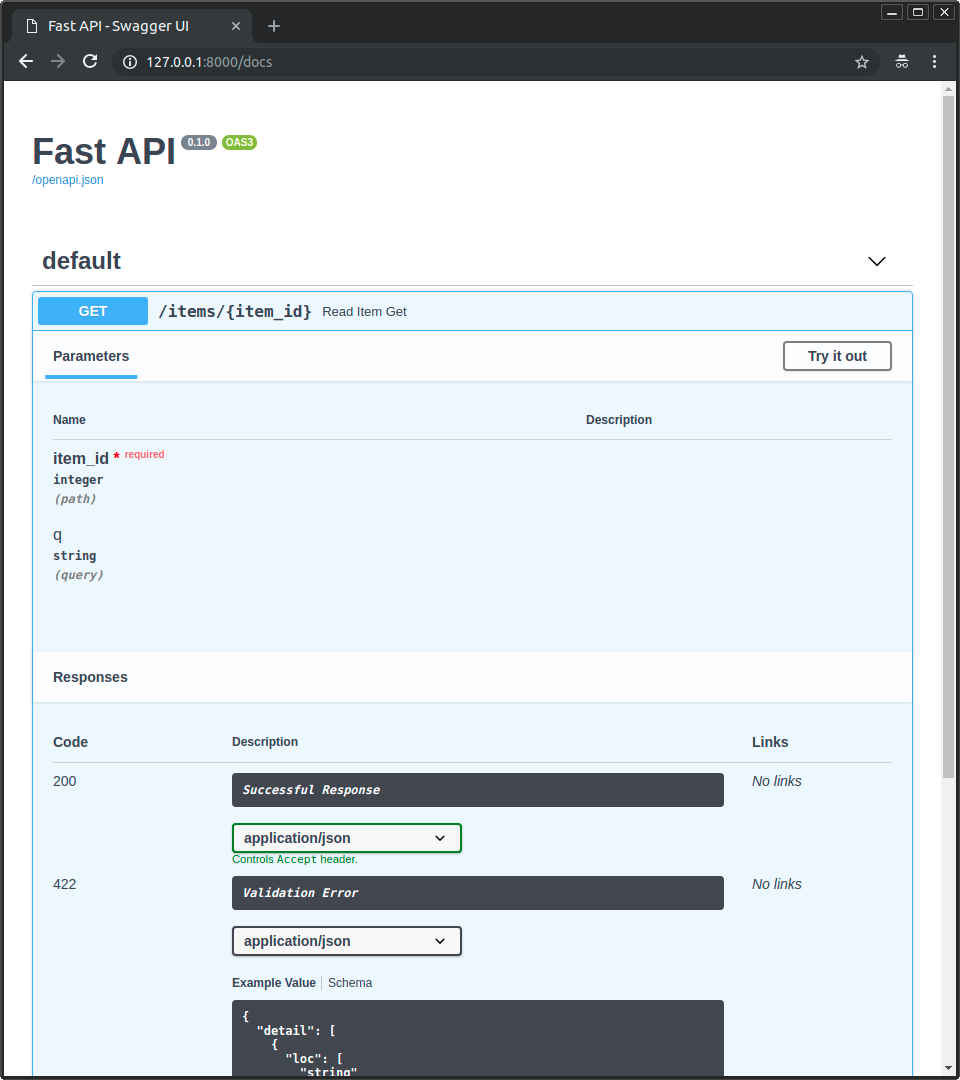 | |
| ### Alternative API docs | |
| And now, go to <a href="http://127.0.0.1:8000/redoc" class="external-link" target="_blank">http://127.0.0.1:8000/redoc</a>. | |
| You will see the alternative automatic documentation (provided by <a href="https://github.com/Rebilly/ReDoc" class="external-link" target="_blank">ReDoc</a>): | |
| 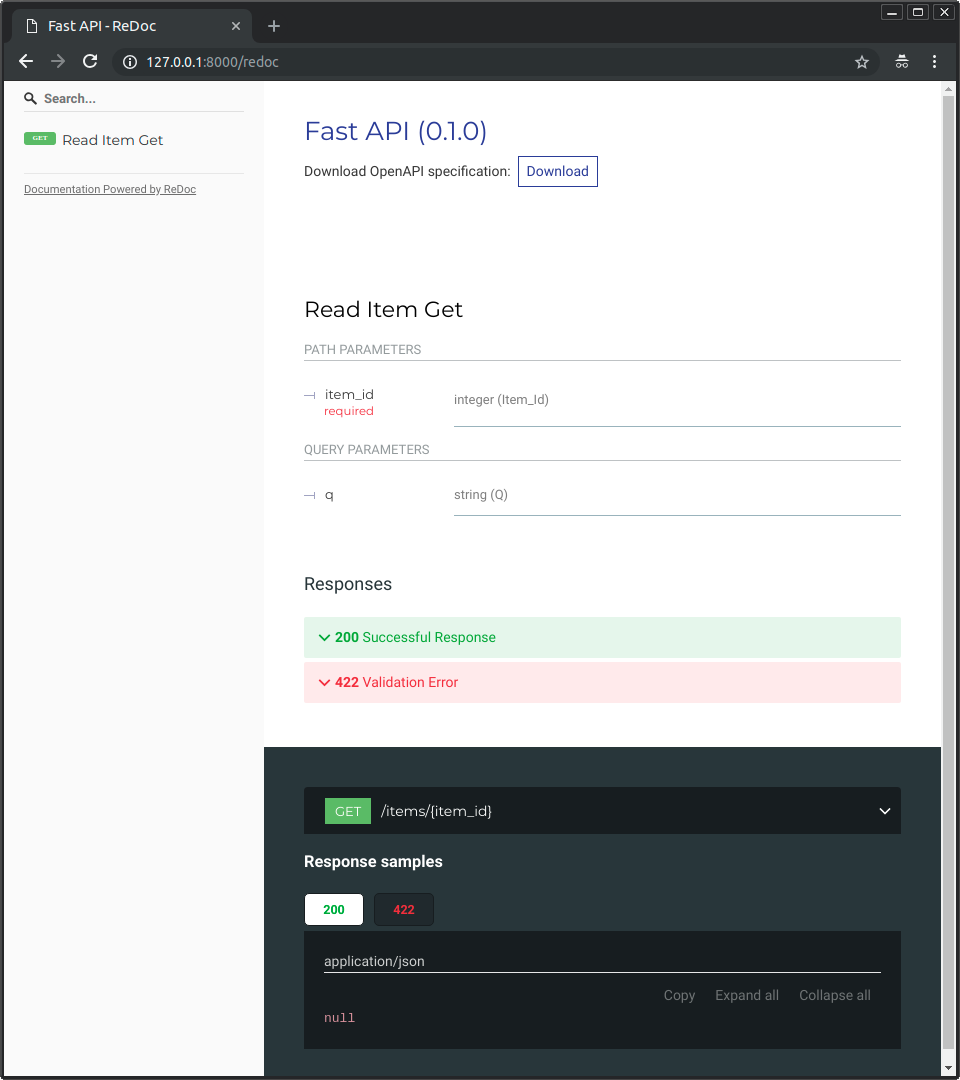 | |
| ## Example upgrade | |
| Now modify the file `main.py` to receive a body from a `PUT` request. | |
| Declare the body using standard Python types, thanks to Pydantic. | |
| ```Python hl_lines="4 9-12 25-27" | |
| from typing import Union | |
| from fastapi import FastAPI | |
| from pydantic import BaseModel | |
| app = FastAPI() | |
| class Item(BaseModel): | |
| name: str | |
| price: float | |
| is_offer: Union[bool, None] = None | |
| @app.get("/") | |
| def read_root(): | |
| return {"Hello": "World"} | |
| @app.get("/items/{item_id}") | |
| def read_item(item_id: int, q: Union[str, None] = None): | |
| return {"item_id": item_id, "q": q} | |
| @app.put("/items/{item_id}") | |
| def update_item(item_id: int, item: Item): | |
| return {"item_name": item.name, "item_id": item_id} | |
| ``` | |
| The `fastapi dev` server should reload automatically. | |
| ### Interactive API docs upgrade | |
| Now go to <a href="http://127.0.0.1:8000/docs" class="external-link" target="_blank">http://127.0.0.1:8000/docs</a>. | |
| * The interactive API documentation will be automatically updated, including the new body: | |
| 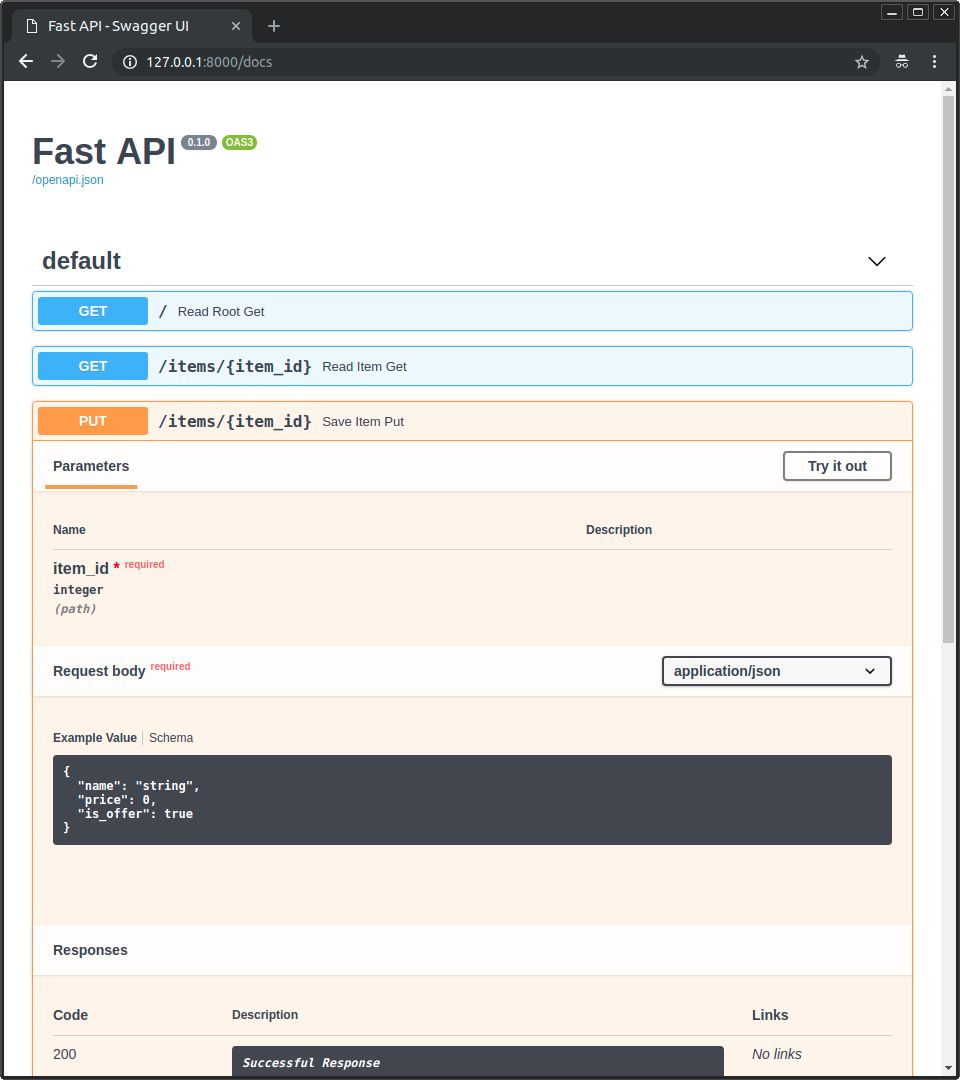 | |
| * Click on the button "Try it out", it allows you to fill the parameters and directly interact with the API: | |
| 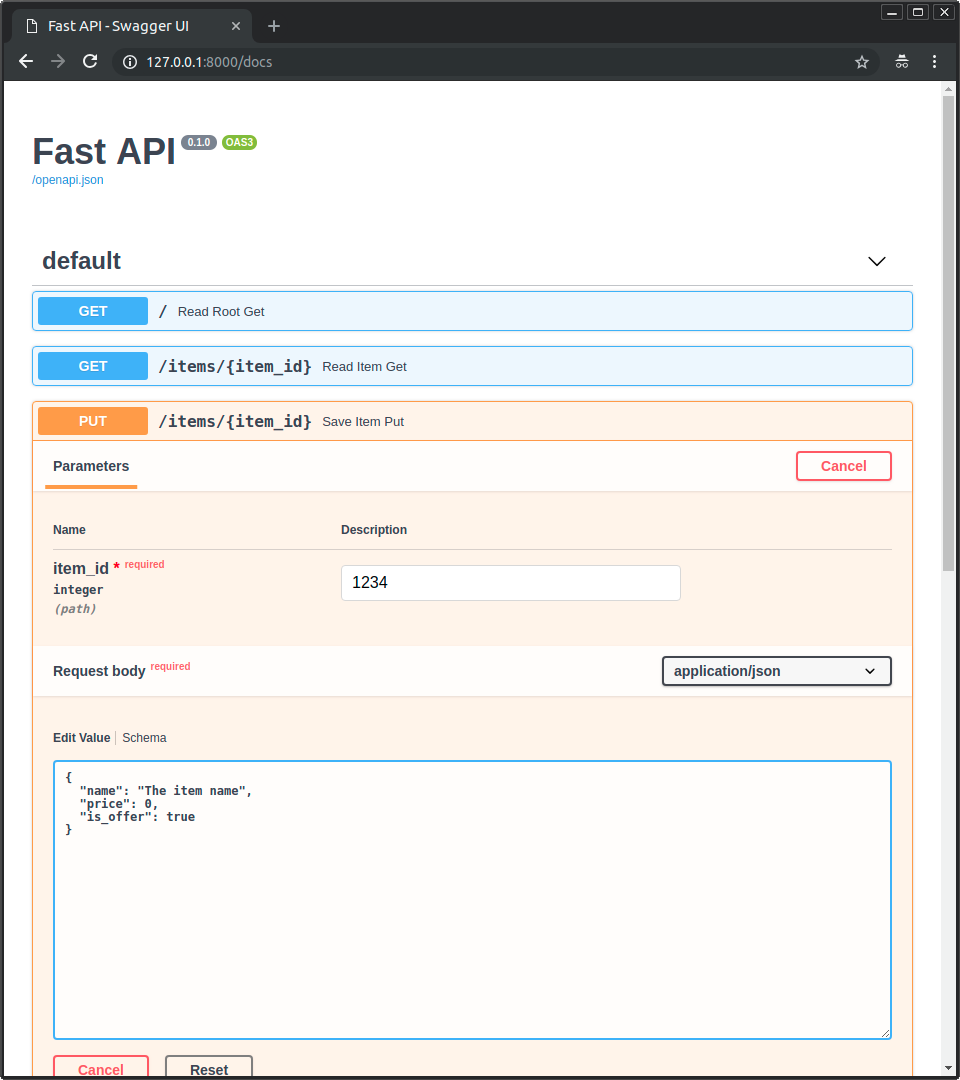 | |
| * Then click on the "Execute" button, the user interface will communicate with your API, send the parameters, get the results and show them on the screen: | |
| 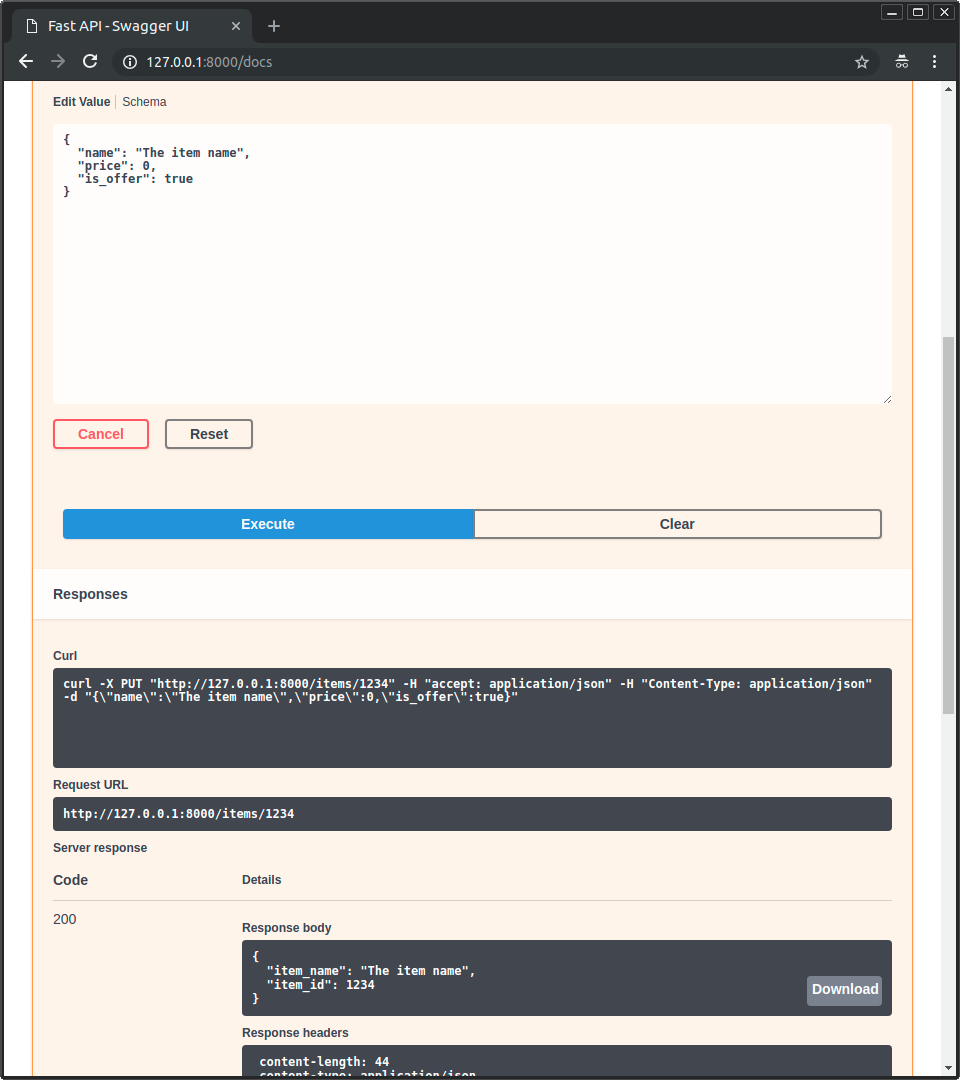 | |
| ### Alternative API docs upgrade | |
| And now, go to <a href="http://127.0.0.1:8000/redoc" class="external-link" target="_blank">http://127.0.0.1:8000/redoc</a>. | |
| * The alternative documentation will also reflect the new query parameter and body: | |
| 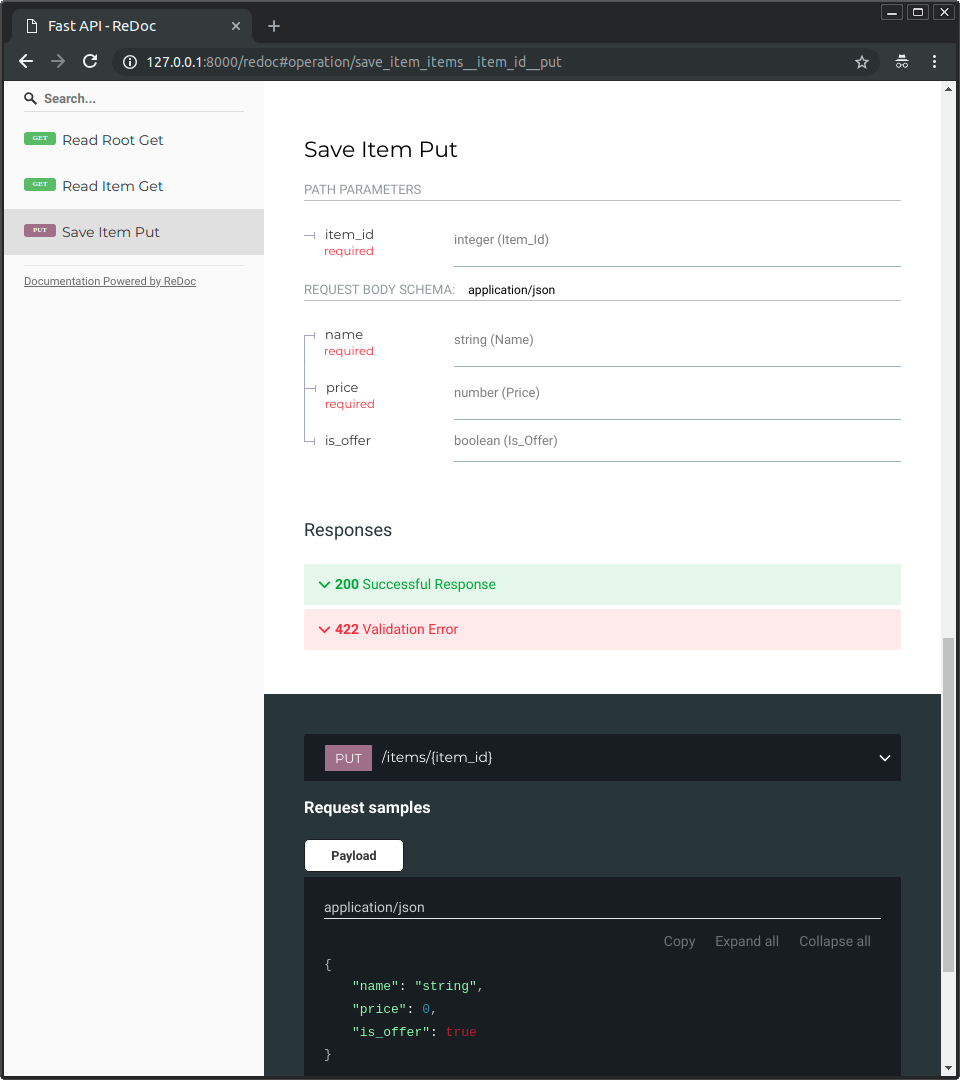 | |
| ### Recap | |
| In summary, you declare **once** the types of parameters, body, etc. as function parameters. | |
| You do that with standard modern Python types. | |
| You don't have to learn a new syntax, the methods or classes of a specific library, etc. | |
| Just standard **Python**. | |
| For example, for an `int`: | |
| ```Python | |
| item_id: int | |
| ``` | |
| or for a more complex `Item` model: | |
| ```Python | |
| item: Item | |
| ``` | |
| ...and with that single declaration you get: | |
| * Editor support, including: | |
| * Completion. | |
| * Type checks. | |
| * Validation of data: | |
| * Automatic and clear errors when the data is invalid. | |
| * Validation even for deeply nested JSON objects. | |
| * <abbr title="also known as: serialization, parsing, marshalling">Conversion</abbr> of input data: coming from the network to Python data and types. Reading from: | |
| * JSON. | |
| * Path parameters. | |
| * Query parameters. | |
| * Cookies. | |
| * Headers. | |
| * Forms. | |
| * Files. | |
| * <abbr title="also known as: serialization, parsing, marshalling">Conversion</abbr> of output data: converting from Python data and types to network data (as JSON): | |
| * Convert Python types (`str`, `int`, `float`, `bool`, `list`, etc). | |
| * `datetime` objects. | |
| * `UUID` objects. | |
| * Database models. | |
| * ...and many more. | |
| * Automatic interactive API documentation, including 2 alternative user interfaces: | |
| * Swagger UI. | |
| * ReDoc. | |
| --- | |
| Coming back to the previous code example, **FastAPI** will: | |
| * Validate that there is an `item_id` in the path for `GET` and `PUT` requests. | |
| * Validate that the `item_id` is of type `int` for `GET` and `PUT` requests. | |
| * If it is not, the client will see a useful, clear error. | |
| * Check if there is an optional query parameter named `q` (as in `http://127.0.0.1:8000/items/foo?q=somequery`) for `GET` requests. | |
| * As the `q` parameter is declared with `= None`, it is optional. | |
| * Without the `None` it would be required (as is the body in the case with `PUT`). | |
| * For `PUT` requests to `/items/{item_id}`, Read the body as JSON: | |
| * Check that it has a required attribute `name` that should be a `str`. | |
| * Check that it has a required attribute `price` that has to be a `float`. | |
| * Check that it has an optional attribute `is_offer`, that should be a `bool`, if present. | |
| * All this would also work for deeply nested JSON objects. | |
| * Convert from and to JSON automatically. | |
| * Document everything with OpenAPI, that can be used by: | |
| * Interactive documentation systems. | |
| * Automatic client code generation systems, for many languages. | |
| * Provide 2 interactive documentation web interfaces directly. | |
| --- | |
| We just scratched the surface, but you already get the idea of how it all works. | |
| Try changing the line with: | |
| ```Python | |
| return {"item_name": item.name, "item_id": item_id} | |
| ``` | |
| ...from: | |
| ```Python | |
| ... "item_name": item.name ... | |
| ``` | |
| ...to: | |
| ```Python | |
| ... "item_price": item.price ... | |
| ``` | |
| ...and see how your editor will auto-complete the attributes and know their types: | |
| 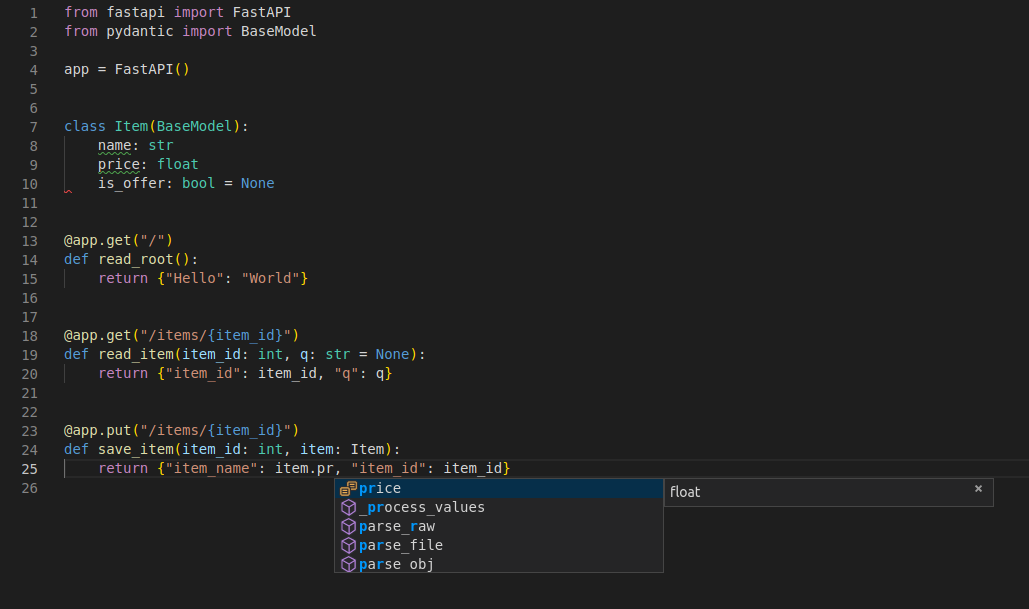 | |
| For a more complete example including more features, see the <a href="https://fastapi.tiangolo.com/tutorial/">Tutorial - User Guide</a>. | |
| **Spoiler alert**: the tutorial - user guide includes: | |
| * Declaration of **parameters** from other different places as: **headers**, **cookies**, **form fields** and **files**. | |
| * How to set **validation constraints** as `maximum_length` or `regex`. | |
| * A very powerful and easy to use **<abbr title="also known as components, resources, providers, services, injectables">Dependency Injection</abbr>** system. | |
| * Security and authentication, including support for **OAuth2** with **JWT tokens** and **HTTP Basic** auth. | |
| * More advanced (but equally easy) techniques for declaring **deeply nested JSON models** (thanks to Pydantic). | |
| * **GraphQL** integration with <a href="https://strawberry.rocks" class="external-link" target="_blank">Strawberry</a> and other libraries. | |
| * Many extra features (thanks to Starlette) as: | |
| * **WebSockets** | |
| * extremely easy tests based on HTTPX and `pytest` | |
| * **CORS** | |
| * **Cookie Sessions** | |
| * ...and more. | |
| ## Performance | |
| Independent TechEmpower benchmarks show **FastAPI** applications running under Uvicorn as <a href="https://www.techempower.com/benchmarks/#section=test&runid=7464e520-0dc2-473d-bd34-dbdfd7e85911&hw=ph&test=query&l=zijzen-7" class="external-link" target="_blank">one of the fastest Python frameworks available</a>, only below Starlette and Uvicorn themselves (used internally by FastAPI). (*) | |
| To understand more about it, see the section <a href="https://fastapi.tiangolo.com/benchmarks/" class="internal-link" target="_blank">Benchmarks</a>. | |
| ## Dependencies | |
| Used by Pydantic: | |
| * <a href="https://github.com/JoshData/python-email-validator" target="_blank"><code>email_validator</code></a> - for email validation. | |
| * <a href="https://docs.pydantic.dev/latest/usage/pydantic_settings/" target="_blank"><code>pydantic-settings</code></a> - for settings management. | |
| * <a href="https://docs.pydantic.dev/latest/usage/types/extra_types/extra_types/" target="_blank"><code>pydantic-extra-types</code></a> - for extra types to be used with Pydantic. | |
| Used by Starlette: | |
| * <a href="https://www.python-httpx.org" target="_blank"><code>httpx</code></a> - Required if you want to use the `TestClient`. | |
| * <a href="https://jinja.palletsprojects.com" target="_blank"><code>jinja2</code></a> - Required if you want to use the default template configuration. | |
| * <a href="https://github.com/Kludex/python-multipart" target="_blank"><code>python-multipart</code></a> - Required if you want to support form <abbr title="converting the string that comes from an HTTP request into Python data">"parsing"</abbr>, with `request.form()`. | |
| Used by FastAPI / Starlette: | |
| * <a href="https://www.uvicorn.org" target="_blank"><code>uvicorn</code></a> - for the server that loads and serves your application. | |
| * <a href="https://github.com/ijl/orjson" target="_blank"><code>orjson</code></a> - Required if you want to use `ORJSONResponse`. | |
| * <a href="https://github.com/esnme/ultrajson" target="_blank"><code>ujson</code></a> - Required if you want to use `UJSONResponse`. | |
| * `fastapi-cli` - to provide the `fastapi` command. | |
| When you install `fastapi` it comes these standard dependencies. | |
| ## `fastapi-slim` | |
| If you don't want the extra standard optional dependencies, install `fastapi-slim` instead. | |
| When you install with: | |
| ```bash | |
| pip install fastapi | |
| ``` | |
| ...it includes the same code and dependencies as: | |
| ```bash | |
| pip install "fastapi-slim[standard]" | |
| ``` | |
| The standard extra dependencies are the ones mentioned above. | |
| ## License | |
| This project is licensed under the terms of the MIT license. | |